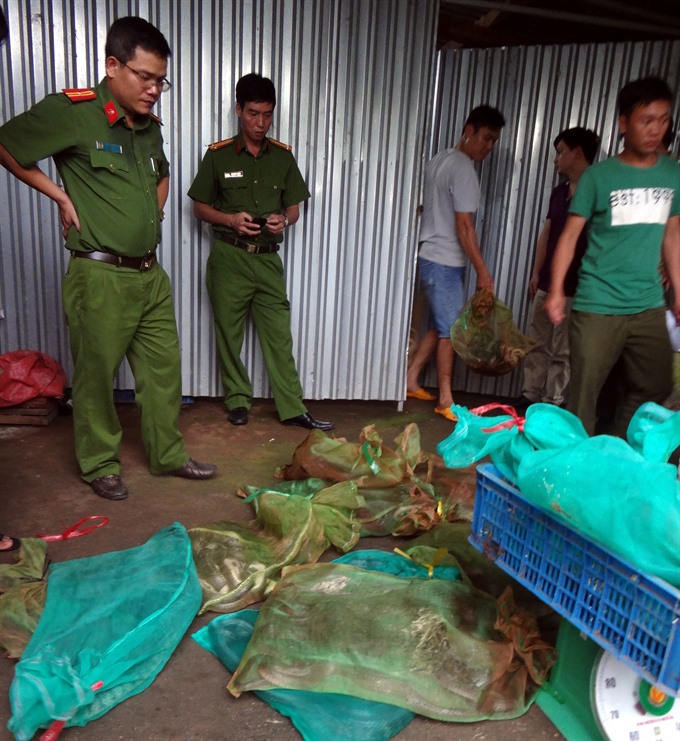 Environment
Environment

Wildlife protection has become stricter under policies outlined in amendments to the Penal Code that took effect on January 1, said Lieutenant General, Associate Professor Trần Văn Độ, former deputy Chief Justice of the Supreme People’s Court and Chief Justice of the Central Military Court.
 |
| Environment police seized a large number of rare wild animals in Lộc Điền Commune, Lộc Ninh District, Bình Phước Province last October. The maximum jail term for crimes related to wildlife management has increased to 15 years. VNA/VNS Photo Dương Chí Tưởng |
HÀ NỘI - Wildlife protection has become stricter under policies outlined in amendments to the Penal Code that took effect on January 1, said Lieutenant General, Associate Professor Trần Văn Độ, former deputy Chief Justice of the Supreme People’s Court and Chief Justice of the Central Military Court.
Protected wildlife under criminal law has been extended from rare, precious and endangered animals to all types of wildlife, he said yesterday at a seminar Việt Nam and law enforcement efforts to protect wildlife organised by CHANGE and WildAid (CHANGE, Centre of Hands On Action and Networking for Growth and Envionment).
Under amended Penal Code 2015, hunting, catching, killing, rearing, caging, transporting and trading wild animals is criminalised. This extends to possession of dead animals, body parts and products of rare, precious and endangered wild animals.
The maximum jail term for crimes related to wildlife management has increased to 15 years.
According to amended Penal Code 2015, violations in protecting rare, precious and endangered wildlife are considered “very serious offence” instead of “serious offence” as stated in the previous code, he said.
“Since 1994, when Việt Nam joined the Convention on International Trade in Endangered Species of Wild Fauna and Flora (CITES), the country has contributed to the protection of rare and precious wildlife. Việt Nam has legalised the treaty in a full manner,” he said.
However, experts at the seminar said that difficulties remained in enforcing wildlife law.
Phạm Quý Tỵ, former deputy minister of the Justice Ministry, former Chief Justice of Hà Nội’s People’s Court and former deputy head of National Assembly’s Judicial Committee, said that violations against wildlife were common, but only a few people had been punished, mostly through administrative procedures. The number of criminal penalties remained low due to difficulties in law enforcement.
“I know a province which uncovered 35 violations in a year, but 34 of them were administratively punished. Only one was accusedc of a criminal offence.”
Tỵ said that difficulties arose during examination of evidence. He said Việt Nam did not have a rare, precious and endangered wildlife examination agency. Four agencies currently in charge of the examination are not judicial examination agencies.
“Carrying animals over a long distance, for example from central Quảng Bình and Quảng Trị provinces to Hà Nội, can kill animals. How to take care of and preserve the seized wild animals while waiting for examination is another problem,” he said.
Nguyễn Khánh Quang, deputy head of the General Department of Customs’ Anti-smuggling Department said that last year, Customs found 47 wildlife trafficking cases, prosecuted 15, including trafficking ivory, rhino horns, pangolin scales by road, sea and air.
In most of the cases, the seized exhibits were unclaimed. The owners were not identified as they hired other people to transport the animals, he said.
Experts agreed on the need for close co-ordination among law enforcement agencies and support of non-governmental organisations, scientists and the public in wildlife protection.
CHANGE and WildAid will support law enforcement in wildlife protection this year through communication campaigns, training workshops to improve capacity of law enforcement officers and students majoring in law enforcement, said Hoàng Thị Minh Hồng, CHANGE director. - VNS